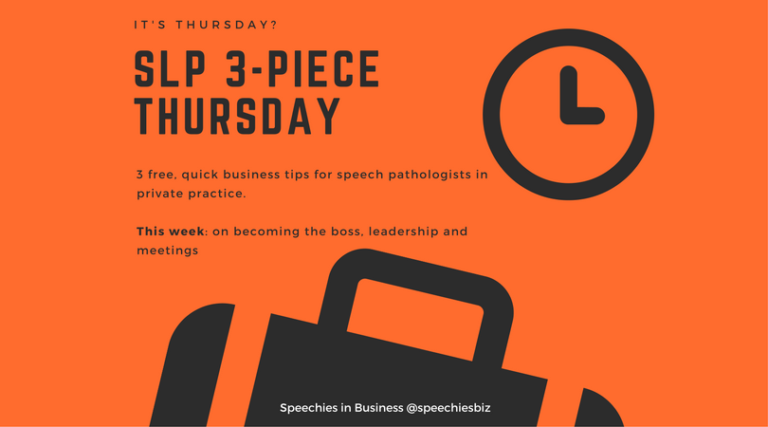Turning Pro – Part 3 – 9 final tips to launch and run a professional speech pathology practice
In a world that, increasingly, seems to reward wannabes, amateurs and charlatans, “Turning Pro” in any field of work is hard. Staying Pro is even harder.
In this, our third and final instalment, we give speech pathologists 9 more tips to do just that.
Here are Parts 1 and 2 to check out.
On with the tips!
21. The professional is courageous.
One of our most important roles as speech pathologists is to advocate for the needs of our clients. Sometimes, this means we need to ruffle feathers. To fight bureaucratic madness. To squeeze blood from stones. To say things that are unpopular. To challenge that status quo – even within the profession.
As humans, we’re programmed to care about others’ opinions. But if you worry too much about what others think, you’ll never be a professional. Some of my legal colleagues thought I was having a mid-life crisis when I retrained as a speech pathologist and opened my clinic. Perhaps they were right. But thank goodness I found the wherewithal to just do it. Who wants to die wondering?
22. The professional will not be distracted.
It’s easy to lose sight of your purpose and get buried in trivia, red tape and nonsense. One of my favourite words is focus. John Lee Dumas taught me a terrific acronym for FOCUS: Follow One Course Until Success.
In addition to my no news, no social media policy, I use Asana and Timely to keep me focused on the two to three key things I want to achieve each day for my clinic. Anything not on that list or related to my daily therapy deliverables waits until the main tasks are done.
23. The professional is ruthless with herself.
Tasks tend to take up as much time as you give them. Once your basic systems are up and running and you’ve been at it for a while, complacency can set in and you can find yourself drifting toward disaster.
At the start of each quarter, I sit down with my operations manager and set 2 to 3 “stretch goals” I’d like to achieve if “time permits” – goals and projects I really care about that I won’t let myself chase unless I’ve done everything else I need to do first. This pushes me to use my time more efficiently.
Speechies in Business started as a stretch projects. I also have a short list of online training courses to do whenever I have an unexpected break. So, if I have an FTA, I don’t give myself an hour off for coffee and chit chat. Instead, I attack a project I’m passionate about or learn something to help my clients.
24. The professional has compassion for herself.
Working closely with people – particularly kids, in Winter – means we get exposed to all kinds of bugs. Sometimes, even with a rigorous Infection Control Policy, a balanced diet, regular exercise and enough sleep, we fall ill.
When I’m sick, I give into it quickly, reschedule appointments, go home, go to bed and focus on getting better. A lingering sniffle, hoarse voice and hyponasal resonance is not a good look for a speech pathologist. I can operate competently with 50% power. But my clients deserve better than that.
25. The professional lives in the present.
Regrets about the past and anxiety about the future can seriously undermine your confidence and professionalism. Without wanting to sound too New Agey about it, having a clear idea of what you are seeking to achieve and then doing the work immediately in front of you to the best of your abilities is a great way to combat regret and anxiety. I find taking 20 minutes a day, twice a day to meditate helps me to focus on the present, too.
26. The professional defers gratification.
Yes, I need to eat and have somewhere to live. But I don’t need the biggest house, the newest car, the latest fashions (ha, far from it!) or the latest gizmos.
In my previous life, I always “had to have” the latest phone, the best stereo, meals at Michelin-rated restaurants, and the fancy holiday to the Maldives. In my new life, I leave as much money as I can in the business so I can grow it, listen to streamed music on a hand-me-down iPod, take regular short road trips with the family in our station wagon, and dine out at sports-clubs. While we’re not keeping up with all the Joneses (or Smiths or Lams for that matter), we still have a great quality of life.
27. The professional does not wait for inspiration.
This is a big one for me. Sometimes – usually it’s a Tuesday – I walk into the clinic feeling as flat as a stomped-upon tack. I look at the mountain of reports I have to write, all the sessions I have to plan and deliver that week, the blog articles I’ve committed to research and to write, and nearly despair. Then I have a coffee, review my key tasks for the day, look at my stretch goals (the cool stuff I get to do if I finish my daily tasks on time), do a couple of star jumps, turn on my task timer, and jump into it.
Don’t wait for inspiration to strike. Often, I have my best business and clinical ideas while I’m working on something hard or boring (or both).
28. The professional does not give away her powers to others.
For me, this is about not judging myself against the success and achievements of others. I don’t have the largest clinic in my area, or see the most clients a day. I work hard and am certainly not making millions!
But, I:
- run my own show;
- see my kids every day;
- spend my working hours helping people to improve their communication skills to participate more fully in life;
- choose my own hours;
- get to educate and advocate for others, e.g. by speaking at schools and community events;
- receive regular thanks from people all over the world about the quality of the free information on my website;
- am having my free Lidcombe Program activity book translated into other languages to help children who stutter around the world;
- get to contribute to local community events and causes I’m passionate about;
- learn new things – about client needs, clinical practice and myself – every day; and
- get to help other speech pathologists in private practice benefit from my business and legal experience with low-cost templates, scripts and resources and web-content writing services through Speechies in Business.
What a privileged and lucky life I lead!
29. The professional helps others.
This, to me, is why most speech pathologists in private practice are naturally professional. Speech pathology is all about serving others: helping other people to achieve their goals. We work face-to-face with people in need every day. And, at least in my experience, speech pathologists are incredibly generous with their time and expertise in mentoring and supporting other speech pathologists.
The support and training I have received from other speech pathologists – often free of charge – is what inspired me to want to give back to the profession through Speechies in Business.
Final thoughts on Turning Pro
This series of posts has been fun to write, but challenging to execute in practice. We hope you’ve found them useful or inspiring (hopefully both)!
Ultimately, we are responsible for our own professional conduct and reputations. To be professional, we need a firm commitment to evidence-based service and ethical conduct. But we also need to treat ourselves more like we treat our clients. We need to feel more compassion for ourselves. We need to stop asking others for permission to launch and build the private practices of our dreams and to create and deliver the services our clients need.
Main source: Steven Pressfield (2012). Turning Pro: Tap into your Inner Power and Create Your Life’s Work. Black Irish Books, NY, NY. Well worth a read. You can get it here.
Image: https://bit.ly/1J3YMHl








